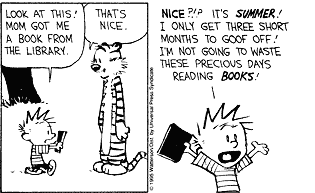e nough', n. satisfying the need or desire; adequate; sufficient.
According to the American Heritage ® Dictionary of the English Language,
enough (along with its synonyms
sufficient and
adequate) has the connotation of having what is needed (or being
what is needed)
without excess.This dictionary entry suggests to me is that
enough is very desirable. As I consider my deepest longings I conclude that they mainly consist of simply having my needs and my desires satisfied. That makes
enough the answer to many of my bigger life questions. While I was away from my routine on vacation, this theme kept recurring. I began to wonder:
How much is
enough rest?
How much is
enough activity?
How much is
enough play?
How much is
enough work?
How much is
enough sleep?
How much is
enough wakefulness?
How much is
enough solitude?
How much is
enough togetherness?
How much is
enough silence?
How much is
enough talking?
How much is
enough learning new information?
How much is
enough reflection on this new information that I can understand how it applies in my life?
How much is
enough spontaneity?
How much is
enough structure?
How much is
enough worship toward God?
How much is
enough service toward others?
Discerning the balance between these polarities isn't always easy for me. I believe that the answers become easier to figure out as my attitudes about
things are examined and recalibrated
. Doing this provides a pattern for the deep heart to reference when considering all the other needs and desires (I'm talking legitimate desires here, not indulgence).
Our culture is both fragmented and fractured in its insane attachment to
things. The unabated lust for affluence and consumption in contemporary society renders us out of touch with reality. Our appetites become distorted, inciting cravings for things we neither need nor want. The increasingly outrageous portions restaurateurs serve us provides a excellent symptom of the sickness.
As we slough off the toxic tendency toward seeing how much we can produce, amass and consume, a freedom to choose simplicity emerges. This is not a tendency toward asceticism, which is perhaps imagined to be the opposite of materialism, but rather the enjoyment of
things without having one's heart set on them. Balance. Centeredness.
As I reset my attitude toward
things -- both those things I have already acquired and those I might desire to have, I find that it becomes easier to step back and say "enough" in regards to other tendencies. Where heretofore I might have kept on talking, or sleeping or working, I'm finding it a little bit easier to pause and view the circumstance more objectively. It's then that I realize I've actually had
enough -- my genuine desire or need has been delightfully met.
I am increasingly drawn to the attractiveness of this liberty to eschew
excess. A strangely expansive and powerful feeling accompanies my
enough. It's as though I'm being incrementally unfettered as I exercise newly utilized options regarding my own appetites. Quite naturally (perhaps axiomatically), the shifting internal realities manifest in external behaviors.
It all reminds me of this scripture passage:
But seek first [the Kingdom of God] and His righteousness, and all these things shall be yours as well.-- Matthew 6:33
It beckons me to an inner reality of joyous simplicity graced with freedom from the tyranny of anxious self-absorbtion. No need to grasp to have or experience enough -- whatever the need or desire, it will be adequately and sufficiently satisfied.
Have I said enough?











